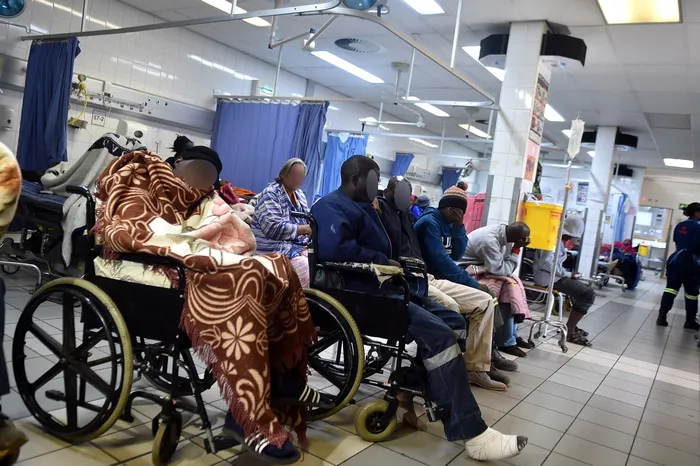New health admin has job cut out

In this 2019 picture these patients were among hundreds waiting to be attended to at Mamelodi Day Hospital and who claimed they had waited for hours. Picture: Thobile Mathonsi/Independent Newspapers
AGEING equipment, run down facilities, long queues, and a system which has failed to enter the 20th century, are among the challenges faced by the public health system, and which need to be tackled first by the new health administration.
Health workers and communities have identified these factors as the main cause of a failing health system on which at least 80% of South Africans depend.
“With the National Health Insurance merging the public and private sectors and so requiring that everyone has an equal chance to treatment,” Centurion resident Dolly Nxumalo, worries about the health system’s capacity to cope with this additional burden.
She said a seemingly simple visit for inoculation for her baby meant taking a day off work and a loss of a day’s income.
Nxumalo who works at a factory in Pretoria West, said she and her six-month-old had to be at the clinic by 6:30am in order to be in front of the queue to be able to get inside when doors opened at 8am.
“But we only got our file after 11, saw the nurse an hour later, and now, at 3pm we are finally done because we also had to wait in the pharmacy line for medication for the slight cold my baby has,” a patient said.
She was at a taxi stop with a neighbour (who asked not be named) who had gone to the same clinic to collect chronic medication. “This is my life every month...I am at the clinic by 6:30, the staff starts arriving by 7:30, open the doors after 8 after which they usher us in.”
The patient further said, “Another hour or so wait later we start the process to get our files, but this is disturbed by staff tea times, and by the time we start the slow move from one section to the other it is almost lunch time; that means another hour long break.”
The women said they were so tired by the time they were seen to, that often they would have to return the day after for the meds. “I shudder to think of my illness forcing me to go into hospital, because from what I understand it can take a couple of days before one gets the attention required, and even then doctors are in such a rush to move through the wards one cannot ask questions and understand their health situation.”

As the country ushered in a new administration under Minister for Health Dr Aaron Motsoaledi, early last week, a video of Free State Premier Maqueen Letsoha-Mathae visiting a local hospital went viral. In it she’s heard rebuking staff for their poor treatment of patients.
In the footage, Letsoha-Mathae asked staff why they were not paying attention to patients in the queue, and why old women should be made to sit and wait as if staff did not know what their responsibilities were.
A public nurse from Pretoria, commented: “She does not understand the system and its challenges and was only playing to the crowd. Overworked staff, an understaffed sector and a lack of tools have to be taken into consideration.
“In as much as it is bad to see the sick, children, the elderly, often hungry and, right now, cold, waiting in stuffy conditions for hours while we seemingly walk past them, there is so much more that goes on.”
The nurse of 16 years, added: “When a doctor has to be in two or three different hospitals in one morning, do clinic duty, and still give of themselves in a professional way, it is difficult.
“This is dragged down by nursing staff - the backbone of any health facility - either having worked double shift because of staff shortages, being on their feet throughout because we also do administrative and other duties … there is way more than us taking tea breaks and sitting in cubicles,” she said.
The biggest failure of the public health sector, she said, was the absence of an e-health programme, which would allow patients to be spread out evenly across facilities.
Another problem was ignorance that often caused people to end up at the wrong facility: “A simple cough, headache, cut and bruise should be taken to a clinic. But if communities have no hope they come to the hospital, which means they take up the time we should be giving to the more serious ailments.”
The nurse said no hospital was allowed to turn a patient away: “Half the people you find waiting in a queue at a district, regional, and even academic hospital, could have been dealt with at a clinic.”
She added that there was a need for people to be educated about taking care of themselves: “Sometimes it is as simple as eating right, watching one’s weight, resting enough, or even reverting back to what our grandmothers taught us when one felt a pain, rather than rushing to the clinic or hospital and therefore adding to the excessive number of people who need medical attention.”
A former public health doctor, Suraya Maqhoboza, noted: “The piloting of the e-health programme over the past 5 years has failed dismally; the introduction of 4IR has not entered facilities, and imagine how long it takes for our ageing staff to fill out forms, move between cabinets, tend to patients, crank up infrastructure, make plans with non-functioning equipment … all of this is what breaks the camels back.
“The returning minister for health and his staff know about all of this, and they need to get onto it fast if this administration is to make the difference everyone is looking for.”